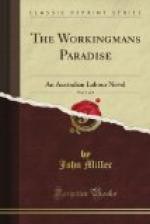They reached the end of the first alley and passed out to the pavement, slippery with trodden mud. There was a little knot gathered there, a human eddy in the centre of the pressing throng. Looking over the heads of the loiterers, he could see in the centre of the eddy, on the kerb, by the light that came from the gateway, a girl whose eyes were closed. She was of an uncertain age—she might be twelve or seventeen. Beside her was a younger child. Just then she began to sing. He and Nellie waited. He knew without being told that the singer was blind.
It was a hymn she sang, an old-fashioned hymn that has in its music the glad rhythm of the “revival,” the melodious echoing of the Methodist day. He recollected hearing it long years before, when he went to the occasional services held in the old bush schoolhouse by some itinerant preacher. He recalled at once the gathering of the saints at the river; mechanically he softly hummed the tune. It was hardly the tune the blind girl sang though. She had little knowledge of tune, apparently. Her cracked discordant voice was unspeakably saddening.
This blind girl was the natural sequence to the sphinx-like head that he had seen amid the black stockings. Her face was large and flat, youthless, ageless, crowned with an ugly black hat, poorly ribboned; her hands were clasped clumsily on the skirt of her poor cotton dress, ill-fitting. There was no expression in her singing, no effort to express, no instinctive conception of the idea. The people only listened because she was blind and they were poor, and so they pitied her. The beautiful river of her hymn meant nothing, to her or to them. It might be; it might not be; it was not in question. She cried to them that she was blind and that the blind poor must eat if they would live and that they desire to live despite the city by-laws. She begged, this blind girl, standing with rent shoes in the sloppy mud. In Sydney, in 1889, in the workingman’s paradise, she stood on the kerb, this blind girl, and begged—begged from her own people. And in their poverty, their weariness, their brutishness, they pitied her. None mocked, and many paused, and some gave.
They never thought of her being an impostor. They did not pass her on to the hateful charity that paid parasites dole out for the rich. They did not think that she made a fortune out of her pitifulness and hunt her with canting harshness as a nuisance and a cheat. Her harsh voice did not jar on them. Her discords did not shock their supersensitive ears. They only knew that they, blinded in her stead, must beg for bread and shelter while good Christians glut themselves and while fat law-makers whitewash the unpleasant from the sight of the well-to-do. In her helplessness they saw, unknowing it, their own helplessness, saw in her Humanity wronged and suffering and in need. Those who gave gave to themselves, gave as an impulsive offering to the divine impulse which drives the weak together and aids them to survive.




